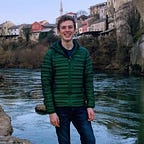Religious dialogue
A pathway to understanding
Jakob Finci has dedicated his life to increasing interreligious dialogue. Trained as a lawyer, he has worn many hats throughout his life, from serving as Bosnia’s Ambassador to Switzerland to the President and founding member of the Interreligious Council of BiH. Additionally, he is active in Sarajevo’s Jewish community, and for decades has worked for and led La Benevolencija, a humanitarian agency that provided free food and medicine to Sarajevo citizens during the war. Despite being run by the Jewish community, La Benevolencija’s services were provided to all Sarajevans, irrespective of religion or beliefs. During that time, Mr. Finci’s organization was the only Bosnian humanitarian organization actively working in Sarajevo.
When the war ended, La Benevolencija reverted to it’s pre-war function as a community center for the Jewish community. However, Mr. Finci didn’t stop fighting for increased religious dialogue. In an interview conducted with him on March 21st, 2017, he told:
Unfortunately, [during the war], religion had been misused by the politicians. The clergy accepted to be misused, thinking, “whatever is good for my people is good for my religion.” And it is clear that crime in the name of religion is the biggest crime against religion. During the Siege of Sarajevo, we [the Jewish community] have been always in very good relations with the Muslim community, the Catholic Church, and with the remaining Serbian Orthodox Church here. We cooperated during the whole war. When the Dayton Peace Accord was signed, we sat together trying to work together and to find out what is possible to be done from the religious point of view, because religion was misused once by the politicians, so maybe now we can use religion for reconciliation between the people.
Thus, the Interreligious Council (IRC) in Bosnia and Herzegovina was born, founded by leaders from the four major religions practiced in BiH. The goal of the newly-created organization was to “prove that the war in BiH was not a religious one, and that religion can be used for reconciliation.” During the past 20 years, the IRC has realized dozens of projects to advance inter-religious peacebuilding throughout the country. Mr. Finci describes the Council as a meeting point for different religious communities to gather and complete join projects, helping all citizens across BiH. One recent IRC project Mr. Finci highlights is the bringing together of students from various religious faculties to learn about other religions. He says this is vital because:
“One day [these students of Islam/Catholicism/Christianity] will be leaders in their religious communities, and it’s much easier to cooperate with others if you know the others around you.”
Additionally, the IRC provides religious education for the citizens of BiH. After 45 years of socialism, the Mr. Finci believes it is important “to teach people what it means to be Muslim, what it means to be Jewish, Catholic, Orthodox… it [is] necessary to fill the gap in the knowledge of our people.”
Mr. Finci believes that there’s always work that can be done to raise the level of religious tolerance in his country, yet it’s not always easy to accomplish. However, he believes best way to increase the level of understanding should be simple:
Just living normally with others and showing that all of us, we are equal and we should be equal. This is the I think the best way to show that the only way here is to live together, to live tolerating others and building the mutual trust that we can live with others.
Born in the Rab concentration camp in 1943, Mr. Finci says he was the first person in his family not to be born in Sarajevo for hundreds of years. Despite overcoming many obstacles in his life, he remains optimistic about the future of his country:
“Walking through the streets of Sarajevo, it is obvious that we are the same. You cannot distinguish who is who on the other side of the street, because… we all look alike… Through this, we are trying to build mutual understanding and raise the level of tolerance as much as possible. We lived like this for five hundred years, and it was never divided between people in Bosnia by ethnic or religious sides… I hope one day we will succeed, if not my generation, then my sons or my grandchildren will live in normal European country. I hope.”
